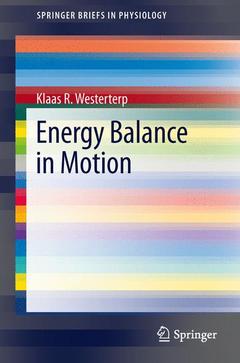Energy Balance in Motion, 2013 SpringerBriefs in Physiology Series
Auteur : Westerterp Klaas R.

Introduction, energy balance in animals.- Energy balance.- Limits in energy expenditure.- Energy expenditure, physical activity, body weight and body composition.- Extremes in energy intake.- Body weight.- Growth, growth efficiency and ageing.- Modern man in line with wild mammals.- Appendix: Simple and valid energy requirement calculation.
An original work focused on the energy balance, especially on the limits of energy expenditure and athletic performance and is therefore different from other books dedicated to the topic of obesity
Physical activity energy expenditure of modern man matches expenditures in wild mammals
Energetics of man and animals under one denominator
Date de parution : 12-2012
Ouvrage de 111 p.
15.5x23.5 cm
Disponible chez l'éditeur (délai d'approvisionnement : 15 jours).
Prix indicatif 52,74 €
Ajouter au panierThèmes d’Energy Balance in Motion :
Mots-clés :
Body composition; Energy Intake; Energy expenditure; Engery balance; Excercise; Nutrition
